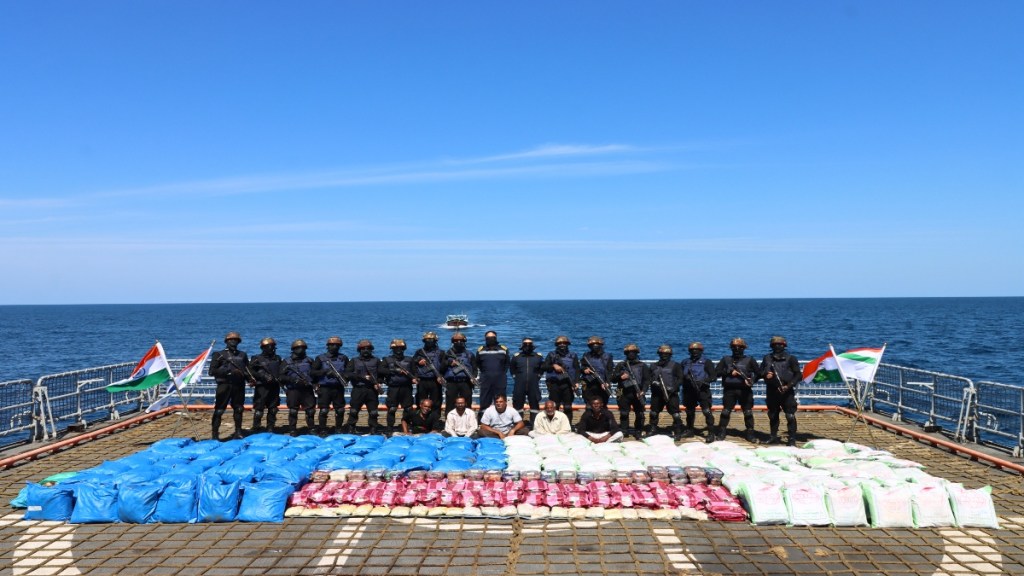Amidst its ongoing efforts to counter piracy threats and Houthi rebel activities in the Arabian Sea and Gulf of Aden, the Indian Navy has also intensified its pursuit of drug smugglers. Leveraging the capabilities of the P8I reconnaissance aircraft, a recent joint operation with the Narcotics Control Bureau (NCB) led to the interception and seizure of over three tonnes of illicit drugs in the Arabian Sea.
Equipped for maritime surveillance and reconnaissance, the P8I plays a pivotal role in detecting and thwarting various threats, from piracy to drug trafficking. In this comprehensive approach to maritime security, the Indian Navy demonstrates its unwavering commitment to safeguarding India’s maritime borders and ensuring the suppression of illegal activities.
It has been reported previously by Financial Express Online that these reconnaissance planes were used in the successful operation against Somalian pirates. P8I (Poseidon), equipped with anti-ship and torpedo, is also used for anti-submarine warfare. That is why is also known as ‘Hunter’. These have been able to scare away the Chinese submarines, as these P8I are successful in keeping an eye from the sea surface to several hundred meters below.
The P8I is an effective surveillance aircraft in the vast area of the Indian Ocean. As a result, the P8I immediately spotted the suspicious boat roaming in the Arabian Sea and immediately alerted the naval warship patrolling nearby.
According to Indian Navy spokesperson, Commander Vivek Madhwal, after sharing intelligence with NCB, Indian Navy warships and reconnaissance aircraft intercepted the suspicious boat after locating and tracking it.
Following this, Marine Commandos (MARCOS) of the Indian Navy entered the suspicious boat through a boarding operation. During the search of the boat, 3300 kg of narcotics were recovered. In this, 3089 kg hashish, 158 kg methamphetamine and 25 kg morphine were recovered.
According to the Indian Navy, usually this smuggling of drugs is done from the Makran coast of Pakistan to India, Sri Lanka, Thailand and other countries of the Indian Ocean region. The entire matter has been handed over to NCB and other agencies for investigation of Tuesday’s incident.
Through this mission the Indian Navy has once again shown that any kind of illegal activities will not be allowed to flourish in India’s maritime borders. This is the reason why whether it is pirates or drone attacks or drug smuggling, the Indian Navy is fully prepared to deal with any kind of threat. P8I aircraft and MQ-9 Reaper drones are helping a lot in these missions of the Indian Navy.
About the MQ-9 Drones
The Indian Navy currently has only two (02) Reaper drones which were taken on lease from the US based General Atomic in 2020. And stage is set for firming up the deal for another 31 MQ-9B by March. Recently, Navy Chief Admiral R Hari Kumar indicated that even if the deal is closed this year, it will take 36 months for these drones to reach India i.e. till 2027. In such a situation, till then only P8I will take the responsibility of keeping the maritime borders of the country safe by staying in the sky over the sea for a long distance and for a long time.
About P8I
In the year 2013, the Indian Navy received the first P8I aircraft from the US based Boeing Company. India was to get a total of 12 P8I aircraft from Boeing in a defence deal worth about US$3 billion.
The last P8I was received by the Indian Navy in the year 2022. The first squadron of P8Is (INS 312) is stationed at INS Rajali Naval Base in Tamil Nadu. Keeping in view the security environment of the Arabian Sea, in March 2022, Indian Navy established the second squadron of P8I (INAS 316) at INS Hans base in Goa. The Arabian Sea is monitored from this Naval Air Base itself.
Since 2013, Indian Navy’s P8Is have flown approximately 40 thousand hours. Considering their excellent performance, the Indian Navy is planning to purchase six (06) additional P8Is from Boeing Company.

